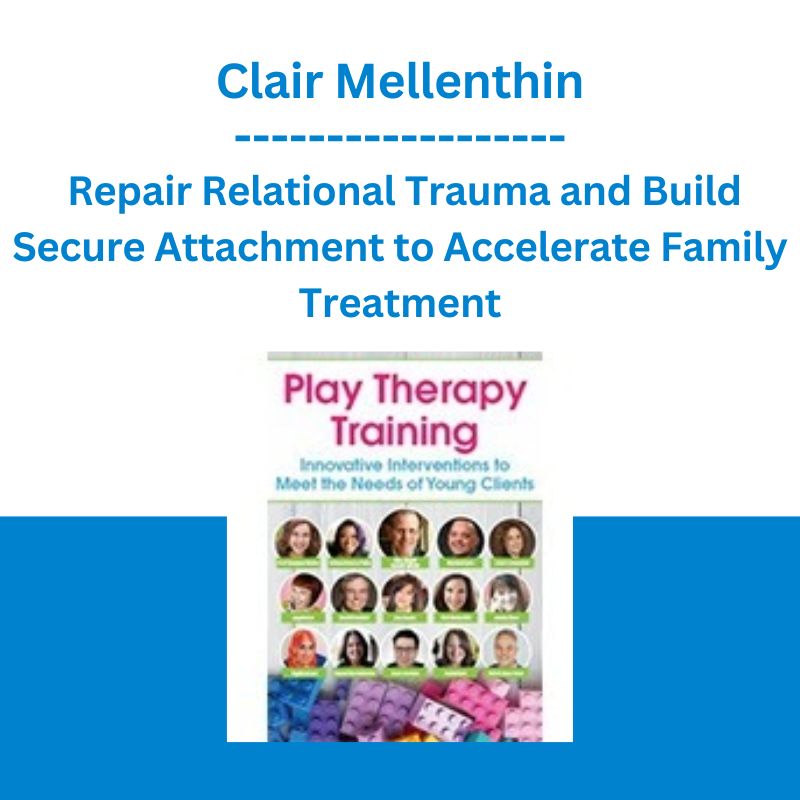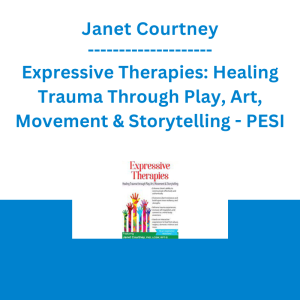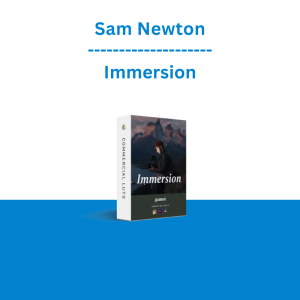*** Proof of Product ***
Exploring the Essential Features of “Clair Mellenthin – Attachment Centered Play Therapy: Repair Relational Trauma and Build Secure Attachment to Accelerate Family Treatment”
When trauma, grief, and loss disrupts the family system, a child may feel unprotected, unloved, or disbelieved, causing relational injury and at times rupture the attachment bond. Children, not having the words to express how they feel, display the hurt in maladaptive ways — aggression, rage, defiance, oppositional behaviors, shutting down, hiding away, or numbing. For the parent, shame is a factor. Shame that they can’t “parent away” the hurt and the misbehavior—that their love isn’t “good enough”.
How do we as therapists, help families begin repairing and rebuilding the lost connection/disruption?
Watch me in this interactive recording to discover an integrative therapeutic approach, Attachment Centered Play Therapy that includes the parents in the therapy process. The parent is integral in creating conditions of security and trustworthiness to address attachment wounds, trauma, grief and loss.
This developmentally appropriate, client-centered method brings a holistic, systemic approach to address:
- Vulnerability to acknowledge the hurt, and the roadblocks
- Challenging issues of shame, vulnerability, grief, and loss
- Aggression and defiance and other maladaptive behavioral issues
- Attachment centered and proactive strategies instead of reactivity or reactive responses
- Repairing and strengthening the bonds of attachment between parent and child
- Parents becoming a resource, as well as coregulator for their child
- Rapport building with parents (this is a MUST in child and family therapy)
You’ll learn new and innovative attachment-centered play therapy techniques including hands on experiential activities, guided imagery, sand tray interventions, and expressive arts—practicing sand tray therapy, techniques assessing family relationships, bonds of attachment, and family dynamics.
We will explore difficult cases, ask questions, develop new assessment skills, and explore styles of attachment and how this plays out in therapeutic relationships with our clients.
Speaker
Clair Mellenthin, LCSW, RPT-S
Clair Mellenthin, LLC
Clair Mellenthin, LCSW, RPT-S, is an international speaker, author, psychologist, and Registered Play Therapist Supervisor. Throughout her career, she has specialized in providing play therapy to children, teens, and their families. She is currently the Director of Child & Adolescents at Wasatch Family Therapy. Ms. Mellenthin frequently presents professional play therapy and family therapy trainings on Attachment-Centered Play Therapy, Family, and Trauma issues both nationally and internationally.
Ms. Mellenthin is a sought-after supervisor, training graduate students and interns in play therapy, and an adjunct faculty member at the University of Southern California MSW program. She is the past-president of the Utah Association for Play Therapy and remains an active member on the Board of Directors. She is the author of the books Attachment Centered Play Therapy; Play Therapy: Engaging & Powerful Techniques for the Treatment of Childhood Disorders; My Many Colors of Me Workbook and has authored several chapters and articles. In addition to being an experienced play therapist and professor, Ms. Mellenthin also appears on local and national TV and radio as an expert on children and family issues. She holds a master’s degree in Social Work from the University of Southern California.
Speaker Disclosures:
Financial: Clair Mellenthin has an employment relationship with Wasatch Family Therapy. She receives a speaking honorarium, recording royalties, and book royalties from PESI, Inc. Ms. Mellenthin is a published author and receives royalties. She has no relevant financial relationships with ineligible organizations. Non-financial: Clair Mellenthin serves on the Utah Play Therapy Association Board of Directors. She is a member of the National Association of Social Workers and the Association for Play Therapy.
Objectives
- Evaluate how to introduce and maintain parent involvement in play therapy to promote a secure attachment.
- Demonstrate two attachment centered play therapy techniques to decrease aggression and defiance in children.
- Inspect generational attachment patterns and how these manifests in family-based play therapy.
- Analyze attachment theory as it applies to play therapy to provide integrated therapeutic treatment.
- Evaluate the four key concepts of attachment theory and how these concepts apply to attachment centered play therapy.
- Analyze various family systems through the lens of attachment theory to strengthen clinical assessment skills
Outline
Advancing Family Treatment with Play Therapy
- 4 key concepts of attachment
- Blending attachment theory with play therapy
- Attachment patterns across the lifespan and impact on parent/child relationship
- Risks and limitations
Invite Parents to Play
- Engagement strategies to strengthen parent/child relationship
- Roadblocks and triggers – parent/child/therapist
- Shame and vulnerability – shame shields
- Build rappaport and make room for parent in the playroom
- Sand tray, genograms, play-based treatment planning
- Establish boundaries and set expectations
- Encourage participation
Attachment Centered Play Therapy Strategies
- Treatment of relational trauma – Attachment, wounding and ruptures
- Parent/child relationship cycle
- Generational attachment patterns
- Catch me if you can
- Butterfly fly away
- Two hands
- Empowerment collage
Case Studies of Abuse; Healing Attachment Wounds
Challenging Emotional and Behavioral Disorders
- Defiance, ODD, moodiness, anger, aggressiveness and school refusal
- Attachment injuries at root of undesirable behavior
- Prescriptive play therapy interventions
- Self-regulation, co-regulation
- Calm down jars, guided imagery
Case Studies of Extreme Defiance and School Refusal
Strategies to Promote Positive Attachment-Based Parenting
- Maximize parent involvement to rebuild trust, repair injuries
- Proactive vs reactive parenting
- Get parent buy in
Case Study of Proactive vs Reactive Parenting
Target Audience
- Play Therapists
- Psychologists Counselors
- Social Workers
- Educators
- Occupational Therapists
- Occupational Therapy Assistants
- Speech-Language Pathologists
- Marriage and Family Therapists
Please see the full list of alternative group-buy courses available here: https://lunacourse.com/shop/










 Janet Courtney - Expressive Therapies: Healing Trauma Through Play, Art, Movement & Storytelling - PESI
Janet Courtney - Expressive Therapies: Healing Trauma Through Play, Art, Movement & Storytelling - PESI  James Tusk - Project Tusk - Number Close To Naked The Complete Guide
James Tusk - Project Tusk - Number Close To Naked The Complete Guide  Filissa Caserta - Increased Intracranial Pressure: Diagnosing & Management Tips and Tricks
Filissa Caserta - Increased Intracranial Pressure: Diagnosing & Management Tips and Tricks  Joe Hudson - The Connection Course
Joe Hudson - The Connection Course  Wendy De Rosa - The Empath's Journey - The Shift Network
Wendy De Rosa - The Empath's Journey - The Shift Network  Tao Of Letting Go Audio Program - Bruce Frantzis
Tao Of Letting Go Audio Program - Bruce Frantzis  TRADING OPTIONS LIVE - 233 Trading Secrets
TRADING OPTIONS LIVE - 233 Trading Secrets  Sam Newton - Immersion
Sam Newton - Immersion  Wendi Friesen - It's All About Love and sex
Wendi Friesen - It's All About Love and sex  Spring Cloud Gateway Resilience and Security
Spring Cloud Gateway Resilience and Security  BT10 Short Course 07 - Footprintings®: Ego State Therapy in 3 Dimensions - Susan Dowell & Richard Miller
BT10 Short Course 07 - Footprintings®: Ego State Therapy in 3 Dimensions - Susan Dowell & Richard Miller  Alexa Mulee, Eboni Webb & Britt Rathbone - DBT Crash Course: Top 20 Tools for Rapid Clinical Impact with Trauma, Anxiety, Addiction, and More
Alexa Mulee, Eboni Webb & Britt Rathbone - DBT Crash Course: Top 20 Tools for Rapid Clinical Impact with Trauma, Anxiety, Addiction, and More  Kristin Kirkpatrick - The Food-Mood Connection: Empowering Psychotherapists with Integrative Strategies
Kristin Kirkpatrick - The Food-Mood Connection: Empowering Psychotherapists with Integrative Strategies  Burt Goldman - Quantum Jumping 2
Burt Goldman - Quantum Jumping 2  Craig Heller - Secrets of Sleep Science: From Dreams to Disorders
Craig Heller - Secrets of Sleep Science: From Dreams to Disorders